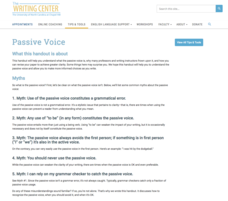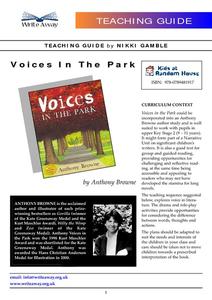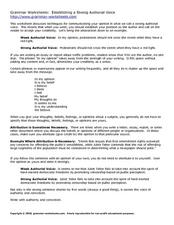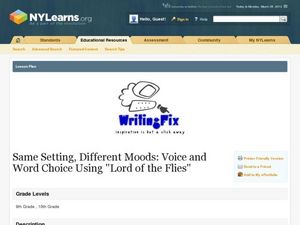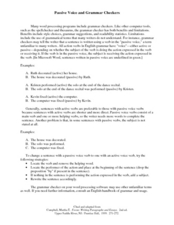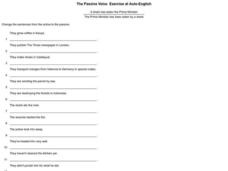Curated OER
Borrowing Narrative Skills from Mr. Fletcher: Using a "Prompts in Reverse" Technique to Inspire Your Writers
Help your class find their writing voices with this instructional activity which uses the work of Ralph Fletcher to guide a "Prompt in Reverse" activity. Using the chapter "First Pen" from Fletcher's Marshfield Dreams, learners decipher...
Curated OER
Rediscovering Forgotten Women Writers
Women's voices are becoming more prominent in the world of literature, but for centuries, this wasn't the case. Young historians research a woman whose writings are considered to be lost, out of print, or forgotten. They develop an oral...
Curated OER
"Voicing" - A Believable Account with "The Glory Fields" by Walter Dean Myers
Dr. Seuss and Walter Dean Myers team up to cover the topic of prejudice. Using The Sneeches (about the culture clash between star-bellied and bare-bellied Sneetches) and The Glory Fields (about a boy coming to America on a slave ship),...
Curated OER
Active and Passive Voice
Six quick slides show the difference between the active and passive voice and how to eliminate the passive voice in one's writing. Identify the subject and verb of the sentences shown, and rearrange them to change the voice. Encourage...
Curated OER
A Poem for Two Voices for Dr. Jekyll and Mr. Hyde
Poems For Two Voices are a great resource in any language arts classroom, whether you are studying poetry or not. Focusing on The Strange Case of Dr. Jekyll and Mr. Hyde, this lesson prompts young authors to write a Poem For Two Voices...
Curated OER
Active and Passive Voice Worksheet 2
How are active and passive sentences constructed? After introducing your intermediate writers to each and providing examples, complete this two-page worksheet. Your writers take the sentences written and transform them from active to...
University of North Carolina
Passive Voice
Why was the road crossed by the chicken? Because the writer forgot to write in active voice. Many myths surround the use of passive voice. Thankfully, an informative handout explains how to recognize passive voice and when it's okay to...
Write Away!
Voices In the Park
Explore the impact a narrator's point of view has on a story with a reading of the children's book, Voices in the Park by Anthony Browne. Written in four different voices, the story is told and retold from different perspectives to...
Thoughtful Learning
Adjusting Your Writing Voice
"Yo, what's up?" "Nuttin!" While such a dialogue might be appropriate between friends, it would be ill-advised in more formal situations. A mini-lesson asks young writers to consider how to adjust the voice they use to bring their...
Curated OER
Establishing a Strong Authorial Voice, Worksheet 2
Young writers are asked to revise and modify a series of sentences to make them stronger and relay a sense of voice. No definitions or models are given. You might use the learning exercise to check for understanding after a discussion of...
Curated OER
Voice and James Joyce
After reading a text written by James Joyce, middle and high schoolers find examples of passive voice. They share their findings with the class. Use this lesson to emphasize the effect of passive voice in writing.
National Endowment for the Humanities
The Poet's Voice: Langston Hughes and You
Middle schoolers complete a unit of lessons that explore the poetic voice of Langston Hughes. They define voice, read and analyze various poems by Langston Hughes, and complete journal entries for each instructional activity.
Curated OER
Establishing a Strong Authorial Voice
Why do some phrases contribute to a weak authorial voice? The first page of this packet explains what a strong and weak voice sound like, and it lists some common phrases that clutter writing, ultimately weakening it. The second page...
Curated OER
"Knot" the Whole Truth: Writing a Modern-Day Story with a Tall Tale's Voice
Beyond Paul Bunyan and his blue ox, tall tales can be a great way to teach young writers about word choice and voice in their writing. Using Jerry Spinelli's Maniac Magee and the Six-Trait Writing process, they begin to write their own...
Curated OER
Active and Passive Voice: Finding Examples Online
Incorporate technological fluency with a search for examples of active and passive voice in online resources. Discuss how use of active or passive voice influences mood or tone and contributes to author's purpose. List of...
Curated OER
Style and Voice
Develop the writing skills of your high school class. Writers consider their personal style and voice, read selections by other authors, and then write pieces that challenge them to experiment with their own style.
Curated OER
The Passive Voice Exercise
A clear example of a sentence in both active and passive voice is shown at the top of this resource and gives writers a clear example to follow. For the next 12 sentences, they change the voice from active to passive.
Curated OER
Developing Your Writing Voice
Developing a distinctive voice is a challenge all writers face. Here’s a presentation that defines the parts of voice (attitude, syntax, diction) and then asks viewers to engage in a series of activities designed to model how to develop...
Curated OER
Dr. Jekyll and Mr. Hyde: Poems for Two Voices
"That man is not truly one, but truly two." The Strange Case of Dr. Jekyll and Mr Hyde offers readers a change to craft a poem combining words and phrases from Robert Lewis Stevenson's novella to create a poem for two voices. The...
Curated OER
Same Setting, Different Moods: Voice and Word Choice Using Lord of the Flies
Whether it's dark, delightful, or somber, set the mood with William Golding's Lord of the Flies. High-schoolers practice descriptive writing by creating the appropriate mood for an original scene, starring one of the book's main characters.
Curated OER
Voice
In these writing style worksheets, learners practice developing their writer's voice. Students complete three activities that help them with their writing voice.
Curated OER
Passive Voice and Grammar Checkers
This handout gives an overview of the passive and active voices as well as pointing out that the grammar checkers in word processing programs mark sentences written in the passive voice as incorrect. While this is not an interactive...
University of Delaware
Active and Passive Voice
Here's a handout that not only explains the difference between active and passive voice and when each form should be used, but also provides a practice exercise as well.
Curated OER
The Passive Voice Exercise
Can your writers change a sentence from the active voice to the passive? Test them with this 12-question worksheet. Twelve short sentences are provided, and your learner must edit each so that it uses the passive voice.








